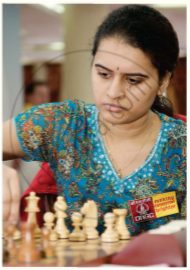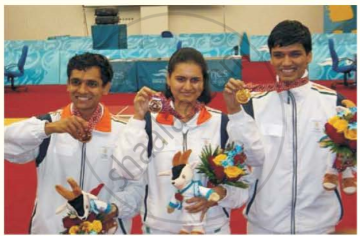Advertisements
Advertisements
Question
When and how did Timothy become unfriendly?
Solution
Timothy grew unfriendly when he was about six months old. The narrator took him out for a walk. Timothy tried to stalk a cat or someone’s pet dog. He used to pull out the feathers of the poultry at night.
APPEARS IN
RELATED QUESTIONS
Thinking about the Poem
Is the poet now a child? Is his mother still alive?
Avik, a correspondent for his school magazine, interviews Grandmaster Koneru Bumpy. Let us read :
INTERVIEW WITH KONERU BUMPY
Avik : Good morning, Ma'am! Congratulations on your achievements in the World Grand Prix Women's Chess Championship in Istanbul recently!

Koneru Humpy : Thank you! This is my biggest win in the women's circuit. This is very significant, considering that it has come in an event which had three former world champions.
Avik : Indeed! Please tell us something about yourself, Ma' am!
Koneru Humpy : I was born in Gudivada, near Vijaywada, in Andhra Pradesh on March 31, 1987. I was originally named 'Humpi' {which means champion) by my father Mr Koneru Ashok, who later changed the spelling to Humpy, to give the nrune a Russian flavour. I write my family name , Koneru, before my given name, as is the convention with the Telugu speaking people. I started playing chess when I was 5 years old.
Avik : Who introduced you to the game?
Koneru Humpy : My father acquainted me with the game. He is also my first coach. I first showed interest at the age of 6 years, when I watched him play a game and suggested a move. Indeed it was the move that actually got me into the game.
Avik : Your father left his teaching profession to make you a champion !
Koneru Bumpy : Yes, when I took the 4th place in the Indian Under 8 Championship in 1995, he decided to leave his career and dedicate his time to me.
Avik : And you had won four World Championship at a very early stage.
Koneru Bumpy : Yes, the World Girl Under 10, the World Girls Under 12, the World Girls Under 14 and World Girls Junior Chrunpionships. I acquired my IM title in 1999 and in May 2002, I achieved my 3rd GM Norms in Elekes Memorial Grandmaster Tournrunent in Budapest.
Avik : You held the record from 2002 to 2008 for the youngest woman ever to become a grandmaster!
Koneru Bumpy : Yes, I achieved it at the age of 15 years, 1 month, 27 days, beating Judit Polgar's previous record by 3 months; which was later lost in the Women's World Chess Championship in 2008 to Hou Yifan. I won the World Junior Girls Chess Championship in 2001 and won the edition or North Urals Cup, the Women's Super Tournrunent held in Krasnoturinsk. In 2006, I participated in the Women's World Chess Chrunpionship, but my crunpaign had to end early in the second round. I played in the first board of Monte Carlo Chess Club and won the last two editions of the European Club Cup.
Avik : You have got some awards also !
Koneru Humpy : Yes, Arjuna Award in 2003, Padmashri Award in 2007 and Raja-Lakshmi Award in 2008.

Avik : In India, many young chess players are ready to take a break in education and are fully focussed on chess preparations. What are your views?
Koneru Humpy : I don't think that taking up chess as a career and completely neglecting studies will be necessary at an earlier stage. After getting to a certain level in the game, they themselves should decide their preferences i.e. whether to play seriously or not.
Avik : What advice would you offer to parents of enthusiastic and talented chess children?
Koneru Humpy : Parents should not compel children to play chess. If children are genuinely interested in the game, they should encourage them. But they shouldn't hurry to get results.

Avik : How often do you exercise? Do you think daily physical exercise can help a chess player to cope with the pressure and increase the brain's ability to concentrate?

Koneru Humpy : I spend around one hour per day on physical exercise. Exercise is a must for every chess player. As the proverb says, 'a sound mind in a sound body'. Exercise shows a lot of impact on the brain.
Avik : Thank you for talking to me and giving valuable advice.
Koneru Humpy : Thank you.
Some are Purple and gold flecked grey
For she who has journeyed through life midway,
Whose hands have cherished , whose love has blest,
And cradled fair sons on her faithful breast,
And serves her household in fruitful pride,
And worship the gods at her husband's side.
Read the lines given above and answer the question that follow:
What’kinds of bangles have earlier been mentioned?
“If you are rested I would go,” I urged. “Get up and try to walk now.”
“Thank you,” he said and got to his feet, swayed from side to side and then sat down backwards in the dust.
“I was taking care of animals,” he said dully, but no longer to me. “I was only taking care of animals.”
There was nothing to do about him. It was Easter Sunday and the Fascists were advancing toward the Ebro. It was a grey overcast day with a low ceiling so their planes were not up. That and the fact that cats know how to look after themselves was all the good luck that the old man would ever have.
Read the extract given below and answer the question that follow.
Why might the old man need good luck at the end of the story?
She again rubbed a match on the wall, and the light shone round her; in the brightness stood her old grandmother, clear and shining, yet mild and loving in her appearance. “Grandmother,” cried the little one, “O take me with you; I know you will go away when the match burns out; you will vanish like the warm stove, the roast goose, and the large, glorious Christmas-tree.” And she made haste to light the whole bundle of matches, for she wished to keep her grandmother there. And the matches glowed with a light that was brighter than the noon-day, and her grandmother had never appeared so large or so beautiful. She took the little girl in her arms, and they both flew upwards in brightness and joy far above the earth, where there was neither cold nor hunger nor pain, for they were with God.
In the dawn of morning there lay the poor little one, with pale cheeks and smiling mouth, leaning against the wall; she had been frozen to death on the last evening of the year; and the New-year’s sun rose and shone upon a little corpse! The child still sat, in the stiffness of death, holding the matches in her hand, one bundle of which was burnt. “She tried to warm herself,” said some. No one imagined what beautiful things she had seen, nor into what glory she had entered with her grandmother, on New-year’s day.
Read the extract given below and answer the question that follow.
What happened to the little girl? What did the people think?
It was the summer of 1936. The Olympic Games were being held in Berlin. Because Adolf Hitler childishly insisted that his performers were members of a “master race,” nationalistic feelings were at an all-time high.
I wasn’t too worried about all this. I’d trained, sweated and disciplined myself for six years, with the Games in mind. While I was going over on the boat, all I could think about was taking home one or two of those gold medals. I had my eyes especially on the running broad jump. A year before, as a sophomore at the Ohio State, I’d set the world’s record of 26 feet 8 1/4 inches. Nearly everyone expected me to win this event.
Read the extract given below and answer the question that follow.
Explain, ‘I wasn’t too worried about all this. I’d trained, sweated disciplined myself for six years with the game in the mind.
How, according to Portia, can the Duke of Saxony’s nephew be made to choose the wrong casket? What do these suitors ultimately decide? Why?
What does ti» poet wish for al the end ~f the poem? What does tl1e poem tell the readers about the poet? Give a reason to justify yow· answer.
Messengers were sent throughout the kingdom
Mark your choice.
Mark the right item.
The greedy couple borrowed the mill and the mortar to make
How was the bear punished when he attacked a beehive?
Why did Swami Haridas say Tansen was ‘talented’?
From the reading of the poem, evaluate the benefits of trees.
What does mother Warn him?
Multiple Choice Question:
For the child, his teacher is ________
Your partner and you may now be able to answer the question.
From the way the child envies the hawker, the gardener, and the watchman, we can guess that there are many things the child has to do, or must not do. Make a list of the do’s and don’ts that the child doesn’t like. The first line is done for you.
| The child must come home at a fixed time. | The child must not get his clothes dirty in the dust. |
|
|
|
Now add to the list your own complaints about the things you have to do, or must not do.
Complete the following sentence by providing a reason:
In the short story, The Sound Machine, Dr. Scott thought Klausner was ill when Klausner rang up the doctor because ______.
In the poem, The Darkling Thrush, the poet uses the words “evensong" and “carolling” to describe the thrush's song because ______.
Choose the option that lists the sequence of events from Alphonse Daudet’s short story ‘The Last Lesson’ in the correct order.
- But, when he arrived at school, Franz was dismayed to find his classmates already seated quietly and solemnly in their places ... and shocked when M. Hamel simply urged him to take his place.
- Franz hurried to school that morning he was very late and dreaded being scolded by M. Hamel, the teacher.
- After he had settled at his desk, he noticed something really odd: the back benches of the classroom were occupied by adults from the village!
- He hoped to slip into the classroom unnoticed, under cover of the bustle and noise of a typical school day morning.
Read the following extract from Stephen Leacock’s short story, ‘With the Photographer’ and answer the questions that follow:
|
“The photographer beckoned me in. I thought he seemed quieter and graver than before. I think, too, there was a certain pride in his manner. He unfolded the proof of a large photograph, and we both looked at it in silence. ‘Is it me?’ I asked. “Yes,” he said quietly, ‘it is you,” and we went on looking at it.” |
- Where was the narrator?
Why had he gone there?
Why do you think that there was a certain pride in the photographer's manner? [3] - What does the word "proof” mean in this context?
Why did the narrator ask, “Is it me?”? [3] - Which of the narrator's facial features had the photographer altered? [3]
- What was the only part of the narrator's face that seemed original in the photograph?
How did the photographer plan to ‘fix’ this? [3] - At the end of the story, the narrator flies into a rage.
What makes him angry?
How would you justify the narrator's angry outburst? [4]
